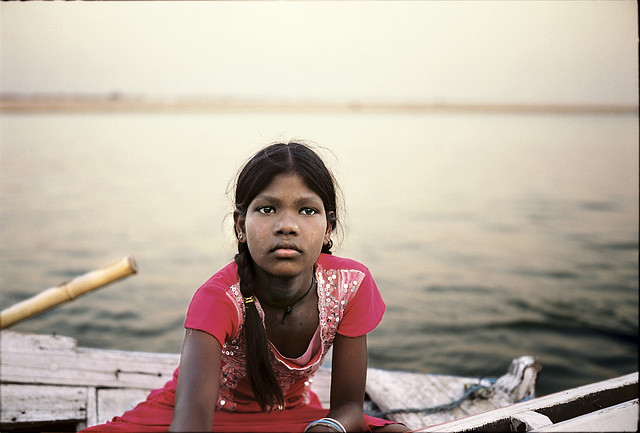In March 2016, I will be flying out to Rajasthan, India to work as a psychotherapist and yoga instructor, and live in an ashram in the middle of the desert.
The population I will be working with are mostly young women seeking refuge at the ashram. Seeking refuge from what? Their marriages.
Consider this:
In India, 47 percent of women are married before the age of 18. In Rajasthan, that number shoots up to a whopping 65 percent. The average age for child marriage is 12 to 16, but can be as young as four to six years old.
More often than not, girls are married off without warning. They are swiftly pulled from school, separated from family and friends, and taken to live with the husband’s family where they are likely to be victims of domestic violence and health complications associated with early sexual activity.
The lack of information about reproductive health means decisions about health and family planning are not left to them. They are considered to be too young to make such decisions. Complications from early pregnancy are the leading cause of death in women aged 15 to 19 in India.
If trends continue as they are, more than 100 million young girls will be married off in the next decade alone.
I just watched a video about a 15-year-old girl who accidentally broke her family’s TV, and was so afraid of her husband’s reaction that she set herself on fire. Setting yourself on fire is the second most common method of teen suicide, next to hanging.
The young women seeking refuge at the ashram have, for the most part, been put on psychotropic medication by their husbands in order to dull and numb them into being “good wives.” I’ve been forewarned that they are walking around like shells of human beings, and it is difficult to see.
I’ll be working with these young women, and getting involved in the planning and implementation of the ashram’s annual Girls Empowerment camp. To enroll, these girls must be between the ages of 15 to 19, and must be unmarried (though many of them lie, and are in fact married).
Sherry, the ashram coordinator, is originally from North America, like me. She started working at the ashram several years ago, originally coming to India with the understandings that I have just presented. She came in passionate, and ready to make a change.
But when she got there, she was shocked.
Many people, including women, were reluctant to let go of the old system, insisting that these systems are actually in place to protect their girls. And I don’t fully understand it yet, but I know that my fury at that fact partially stems from my own ignorance—we can’t, as Westerners, come into any given society that is different from our own, with our biased perceptions of what is right and wrong, and try to impose those beliefs on others.
In preparation for this experience, I’ve been thinking a lot about two subjects:
The concept of shame.
These young girls experience so much pain in their lives because of their life experiences. This pain is a normal reaction to an abnormal (by our standards) situation. However, on top of that, with family values so ingrained into the society, they also feel that it is not normal, or acceptable, to feel that pain. It is highly likely that those feelings are discouraged by anybody who might be a social support to them. It’s not safe to feel those feelings, and so those feelings are wrong.
The concept of values.
In Acceptance and Commitment Therapy here in Australia, we help people get clear on what their values are, so that they know what it means to them to live life full-heartedly. We talk about intrinsic values (those that come from deep in your heart, and need no reasoning behind them—you care about these things, because you just do), and extrinsic values (those that come from wanting to please others or gain support or approval). This is certainly not a safe concept to try to transfer to this population.
So what can I do about this?
Well, it would be foolish of me to think that I can make any difference in the several months that I will be there to the actual value systems of the society, and stop child marriage from happening. Of course, there are many people who do this work, and directly fight for these children by pushing for change. The International Centre for Research on Women (www.icrw.org) is a great resource if you are interested in learning more.
What I can do is work to create microscopic, yet hopefully significant changes in the girls I come into contact with. What I can do is create a safe space for them to name and call out their shame, a safe space for them to try to accept with openness and honesty what it feels like to be them in that moment. To allow them to feel the way they feel, and let that be okay.
And yet, to do so in the service of finding small ways to increase their quality of life and well being. To teach them to find small joys and hold onto them. To encourage them to run, play, dance, laugh, cry, express emotions, express opinions, talk, support, be supported, hug each other, and hopefully, at the end of the day, leave with some understanding of what’s really important in life, on top of keeping with traditional family values.
I will not invalidate these girls any more than they have already been invalidated. I will not tell them that anything about their experience is wrong.
I will try to awaken them to the reality of the present situation. From there, we can try and instill even the smallest glimmer of hope, joy or light for them to carry forward with them.
I am scared senseless of what I’ll be doing. I’ve never done anything quite like it. I don’t know if I can do it—if I can make any real change, and I don’t know how I will emotionally handle the difficulty and the weight of what I’m about to experience.
What I do know is that I’ve spent the past several years working on myself, relentlessly trying to free myself from what yogi sage Patanjali calls “the delusion of the poisonous herb of conditioned existence.” I have, in a certain sense, found freedom, though my journey is no where near done.
I have spent the past several years learning deeply (the hard way) how to love myself and others, how to trust, how to forgive, how to feel hurt, how to rise above, how to motivate myself and others, how to let go of past, how to be wrong, how to make right, how to fight for what I believe in—how to live completely, holding nothing back despite having fear, insecurity, and shame as my constant companions.
That, to me, is true freedom.
Not the absence of difficult life experiences and challenges, but the ability to choose our responses, to find love and light in the worst of situations. That ability can never be taken away from us, no matter what our current life situation is.
And it was Nelson Mandela who said, “to be free is not merely to cast off one’s chains, but to live in a way that respects and enhances the freedom of others.”
~
Source:
Relephant:
12 Tips for Women Traveling to India Alone.
Author: Alexandra Birrell
Editor: Catherine Monkman
Photo: Lyle Vincent/Flickr

 Share on bsky
Share on bsky







Read 0 comments and reply